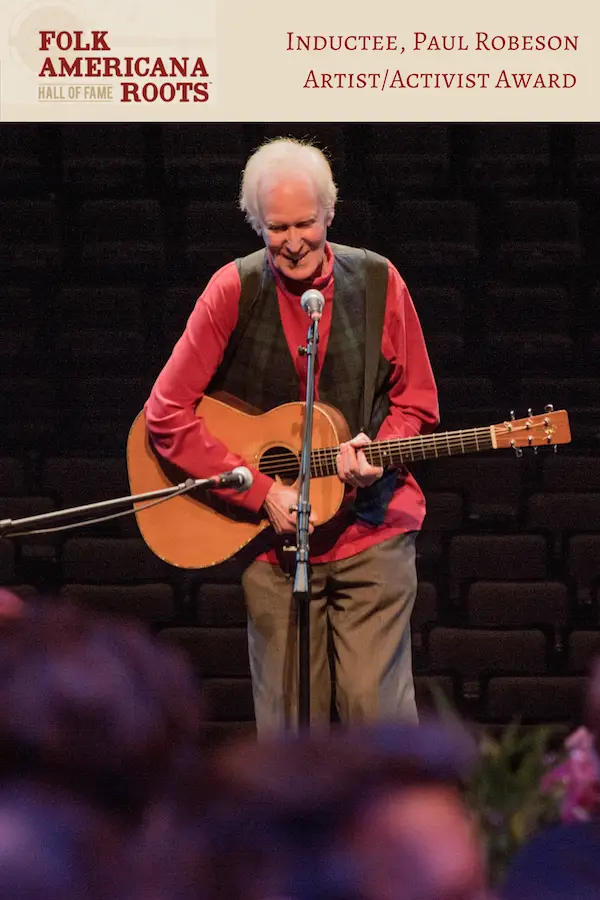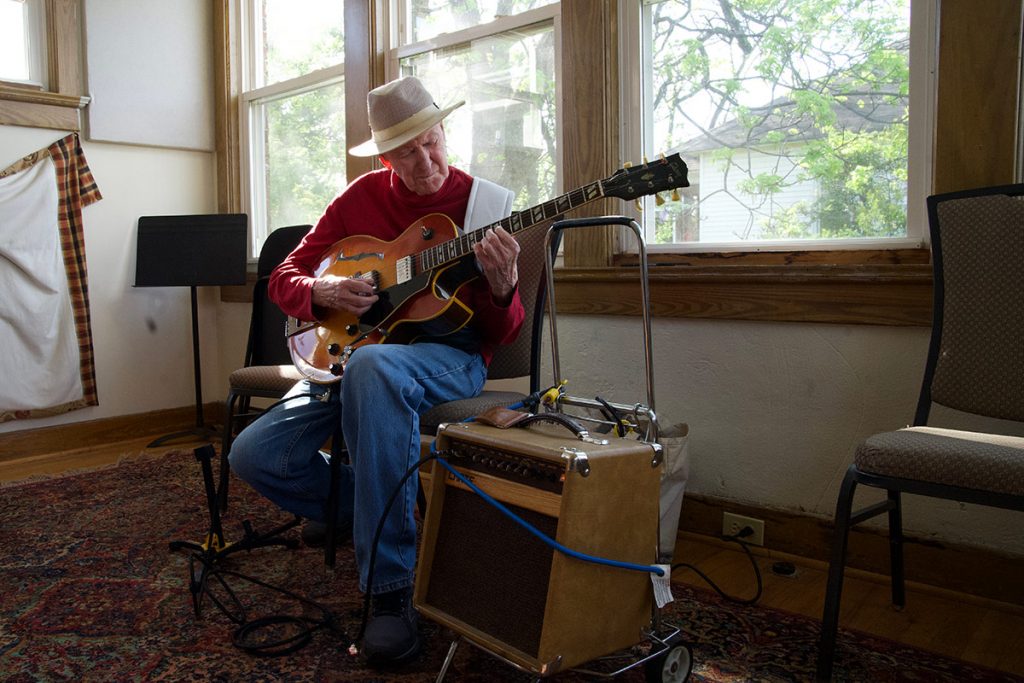The Inaugural Class of the Folk, Americana, Roots Hall of Fame (FARHOF) was inducted on April 19, 2024 at the Boch Center in Boston, MA. As part of the ceremonies, Frank Hamilton was awarded the Paul Robeson Artist/Activist Award. The award “highlights the musicians, journalists, promoters and record executives who, as activists, have insisted that important social justice movements and human stories are preserved.”
Paul Robeson was the epitome of the 20th-century Renaissance man. Robeson was gifted with immense artistic talent while following a steadfast devotion to his moral compass. It is these characteristics recipients of the award embody. Frank Hamilton is a folk musician and a collector of folk songs. He was a member of The Weavers briefly in the early 1960s and performed at the first Newport Folk Festival in 1959. He made his musical home for a time playing guitar and other instruments at the Gate of Horn in Chicago, America’s first folk music nightclub.
His most important contribution to the music community is as an educator. He founded Chicago’s Old Town School of Folk Music in 1957 along with Win Stracke and Dawn Greening. Hamilton taught guitar and banjo and served as unofficial dean. Artists including Pete Seeger, Odetta, Doc Watson, and Bill Monroe performed at the school in its early years. Essential to the Old Town School method is the session that follows after the class lessons. That is when both teachers and students sing and play together at their own level, and especially talented students are invited to perform.
“My philosophy is that music is for everyone; it is not an elitist club,” Frank Hamilton explained. “ It’s something that people can do especially better together than they can separately.”
Hamilton was born on August 3, 1934 in New York City. His father, Frank Strawn Hamilton, was a philosopher and a vagabond who died before he was born. His mother, Judith, taught classical piano years later after they moved to Los Angeles. He learned to play guitar at an early age and in his teens he would spend time at Will Geer’s artist colony. It was there Hamilton met and was influenced by Woody Guthrie and Pete Seeger.
It was at Geer’s artist colony that Hamilton first heard the song “We Shall Overcome,” though at that time it was sung as “we will overcome.” The song had been around for many years and had been sung by workers during a 1945-1946 strike against American Tobacco in Charleston, South Carolina. Seeger, the New England grammarian that he was, decided “shall” was more correct.
Frank Hamilton gave the song a 12/8 gospel beat, which in turn gave the song a more powerful, rhythmic drive. With the change in wording and rhythm, the song became the anthem of the Civil Rights Movement of the 1960s. After hearing the hymn, Dr. Martin Luther King said, “There’s something about that song that haunts you.”
Hamilton, Seeger, and others had been singing and adding lyrics to “We Shall Overcome” for several years before fellow folk singer Guy Carawan informed Hamilton the song had been copyrighted. Those holding the copyright were Hamilton, Carawan, Seeger, and Zilphia Horton. The purpose of the copyright was to keep the anthem from becoming commercially exploited.
Royalties from the song have gone and continue to go to the We Shall Overcome Fund administered by the Highlander Research and Education Center in Newmarket, Tennessee. This is true even today after the copyright, with Hamilton’s blessing, has expired. The fund provides money through grants for programs from diverse racial and ethnic communities working in coalition to end racism, economic and environmental injustice, sexism, and homophobia.

In 1985, Hamilton married Mary Susan Doyle Smith. She would accompany Hamilton on guitar, banjo, ukulele, and Autoharp, and she also taught guitar. Mary worked for Delta Airlines and he relocated to Atlanta, Georgia with her. She died suddenly in 2014. To deal with his grief and perhaps as a way to honor Mary, Hamilton founded his second music school. The Frank Hamilton School opened its doors in 2015 and now meets in eight-week sessions at the Gillespie Building at Decatur Legacy Park.
For someone who was in the forefront of the Folk Revival of the 1960s and played a significant role in the music of the Civil Rights Movement, Frank Hamilton does not have the name recognition of Pete Seeger, Bob Dylan, Peter, Paul, & Mary, or Odetta. That is okay with him.
“As I grew into folk music more I felt I was about the music,” Hamilton said in the film Frank Hamilton and the Folk Revival. “I also felt the whole concept of stardom was wrong for folk music. Folk music was something you did in the living room or on the back porch. Or when you were working. Or when you were just sitting around with folks having a good time.”
Hamilton didn’t fully turn his back on performing but he did spend more of his time teaching. For those who have gone through Chicago’s Old Town School Of Folk Music or Atlanta’s Frank Hamilton School, Frank Hamilton is revered.

